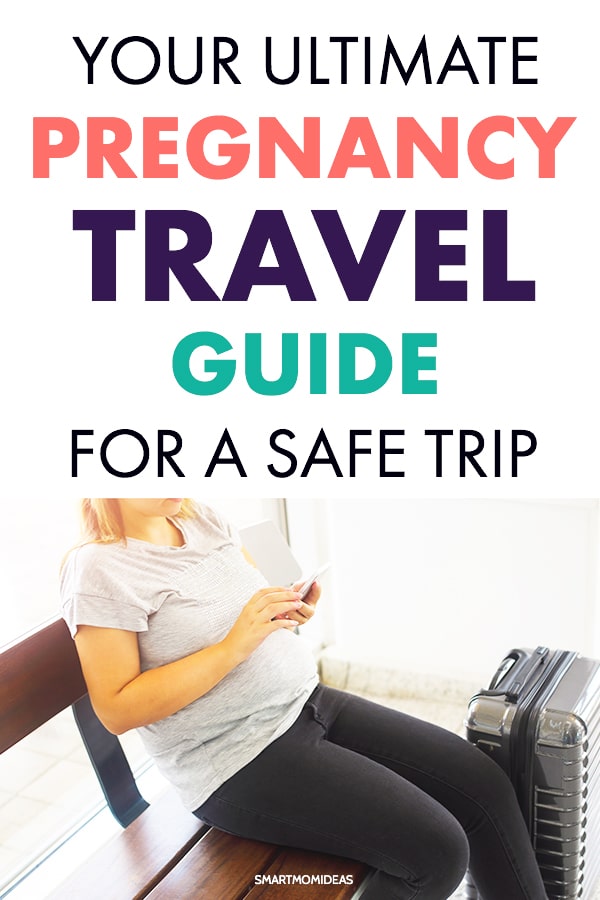Get the best information about pregnancy travel to be safe mama!

Women these days are not letting pregnancy slow them down.
Between work, household and family responsibilities, pregnant mothers are constantly on the go.
If you are with child, there’s no reason why you can’t also go on a an amazing vacation during your pregnancy.
But before you pack your bags and book your tickets, there are many things you should take into consideration before you jet-set off on a worldly adventure.
Your mode of transportation, destination and stage of pregnancy are all factors that can affect your travels.
Here is a pregnancy travel guide you can use to make sure you have a great vacation.
When to Travel When You are Pregnant
Whether you are traveling by car or by plane, it is recommended that you stay close to your home during your 3rd trimester (26-40 weeks). It’s during this time that you are at risk of premature labor and delivery.
Traveling during the 1st trimester (1-12 weeks) can be risky as well, since most pregnancy related emergencies happen during this time.
The optimal period of time for pregnancy travel is during the 2nd trimester (13-26 weeks).
However, despite when you plan on going on your vacation, you should discuss your travel plans with your doctor – especially if you have any medical conditions or there are health risks associated with your vacation destination.
What to Wear When Pregnant and On Vacation
You want to be comfortable when you are on vacation so the clothes you bring need to be the best feeling and easy to pull on your growing tummy.
I like this maternity tank dress since it comes in soo many fun colors. I would pick up at least three of these for your vacation.
For a more casual look this kimono is perfect to accentuate your belly bump while still making you look fashionable in some cute maternity shorts.
And don’t forget some fun travel socks too!
Pregnancy Travel – Traveling Outside of the Country
It’s possible that your vacation may take you out of the country.
While an international adventure can be exciting, you need to be especially careful about out-of-the-country travel during your pregnancy.
Health Coverage
When you leave your home country to enjoy an international vacation, your health coverage may not cover all medical costs should you require a trip to the doctor or hospital.
Depending on your destination, this can get very expensive.
It may be worth it to purchase travel health insurance. These policies are designed to cover emergency health care costs while traveling out of country.
Most plans will cover the cost of an ambulance, emergency room co-payment, hospital room fees and other medical expenses.
Also be sure to bring copies of your prenatal records in case you need to seek medical care. You can request these from your doctor.
Vaccines and Diseases
Before traveling outside of the country, there are 2 things you need to do: talk to your doctor about vaccinations and check your country’s public health agency for any travel warnings and advisories.
Public Health Agencies
Public health websites are a great source of information when it comes to traveling to other countries. There you can find out what diseases are prevalent and other potential health risks.
Here are the websites for Canada and the U.S.:
Public Health Agency of Canada
U.S. Department of Health and Human Services
Vaccines
When you travel outside of the country, you want to make sure you are protected against illness and disease.
It’s important to talk to your doctor about where you are traveling to. They can help determine if there are any personal health issues or necessary vaccinations that you should have.
For pregnant women, live vaccines (used to prevent measles, mumps and rubella) are not safe or recommended. However, inactivated vaccines (for hepatitis B prevention) are considered safe.
Safe Food and Water
There are some areas in the world that have poor quality water and food-borne illnesses. If you are vacationing in one of these areas, be sure to stick to bottled water and well-cooked food.
If you do come across contaminated foods and develop symptoms such as diarrhea and vomiting, seek medical attention.
Avoid taking medications such as Pepto Bismol. These medications contain salicylate, which is found in aspirin, and has been shown to cause heart abnormalities and bleeding issues with unborn children. Speak to a doctor or pharmacist about taking a safe antacid or acid reducer.
Pregnant Travel – Traveling by Car
Not all amazing vacation destinations require a trip on an airplane.
Sometimes the best locations are just a driving distance away!
Even though you may spend a lot of time traveling in a car near your home, there are some things you should consider when taking long distance trips.
Wear Your Seat Belt
No matter how far you are traveling by car, it is important to make sure you are wearing your seat belt – and wearing it properly.
Putting on your seat belt may seem like a no-brainer.
However, now that you’re carrying a child in your womb, you need to be careful how you wear it.
First, lift your belly in order to lay the lap belt low and flat on top of your thighs. Pull on the shoulder strap to tighten it so the belt feels snug – but not too tight. Situate the shoulder belt between your breasts.
Placing the lap portion of the belt directly across your abdomen creates a potential risk of harm to your baby and uterus should you experience an accident.
Make sure to keep your seat in an upright position.
Reclining your seat increases the chances of the belt pressing against the uterus in the event if a crash.
Airbags
Even though airbags are designed to protect you during a front-end or side impact, the force of their deployment against your abdomen may be dangerous for your unborn child.
However, there’s no need to become paranoid about airbag injury. Just make sure you have your seat pushed back as far as you can to put some distance between you and the airbags.
And the extra space will help you feel more comfortable too.
Take Breaks
During long car trips, make sure you are taking a break at least every 2 hours to stretch and use the restroom.
Short walks are great for increasing the circulation of blood in your legs.
This will help to prevent blood clots in your veins and swelling in your feet.
Frequent bathroom breaks will keep strain off your bladder. Because, as you already know, having to hold your pee while pregnant is borderline torture.
Pregnant Travel – Traveling by Airplane
The safest time to travel by plane during pregnancy is the 2nd trimester.
During this time, the risks of miscarriage and preterm labor are at their lowest.
Check with the Airline
Despite where you are in your pregnancy, you should check with the airline to see if they have any policies regarding flying while pregnant. Some airlines may not allow you to fly if you are over 35 weeks.
Also check to see if your prenatal records are required.
Airlines may impose these restrictions or request medical records in order to avoid medical emergencies on the plane.
Location, Location, Location
When you are checking in and choosing your seat, try to get a seat right on the aisle. This will allow you easy access to the restroom.
You’ll also want to take short walks during long flights in order to keep the circulation in your legs flowing.
Just like in a car, make sure you wear the safety belt low on your lap, across your thighs.
When Not to Travel by Plane
You should absolutely avoid air travel when you are past 36 weeks.
As well, if you have any placenta-related problems such as placenta previa (the placenta covers the cervix) or placental abruption (the placenta is detached), it is recommended that you do not travel by plane.
Flying should also be avoided if you are risk of going into early labor.
Risk factors include having previous preterm labor or birth and being pregnant with twins or multiples.
Traveling by plane is especially off the table if your doctor advises against it. This is why it is important to discuss your vacation plans with your health care provider.
Have a Great Vacation!
Even though there is a lot to consider when traveling while pregnant, there is no reason why you can’t get away and enjoy the time you have before the baby arrives.
Just always be conscious about where you are going and how you are getting there – and always, always, always talk to your doctor before taking any lengthy trips.
Over to you – are you traveling soon? What’s in your pregnancy travel plans?
Please pin me!





Leave a Reply